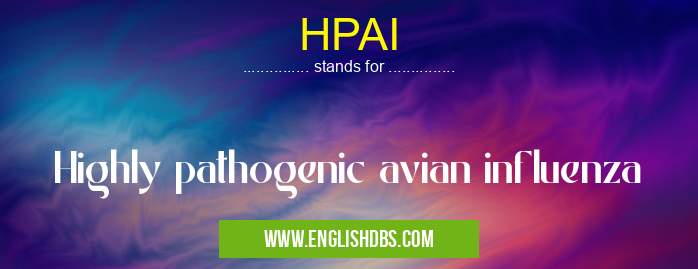What does HPAI mean in CLINICAL MEDICINE
Highly pathogenic avian influenza (HPAI) is a severe and contagious viral disease that affects birds, particularly poultry. It is caused by certain strains of the influenza A virus and can cause high mortality rates in infected birds. HPAI has significant implications for the poultry industry, animal health, and public health.

HPAI meaning in Clinical Medicine in Medical
HPAI mostly used in an acronym Clinical Medicine in Category Medical that means Highly pathogenic avian influenza
Shorthand: HPAI,
Full Form: Highly pathogenic avian influenza
For more information of "Highly pathogenic avian influenza", see the section below.
What is HPAI?
HPAI is characterized by its high virulence and rapid spread among birds. It affects multiple internal organs, causing extensive damage and often leading to death within 24-48 hours after infection. The virus primarily infects domestic poultry, including chickens, turkeys, ducks, and geese. However, wild birds, such as waterfowl, can also be infected and serve as reservoirs for the virus.
Symptoms of HPAI
- Respiratory distress (coughing, sneezing)
- Swollen head and eyelids
- Lethargy and depression
- Loss of appetite
- Diarrhea
- Neurological signs (tremors, incoordination)
- Sudden death
Transmission of HPAI
The virus can be transmitted through direct contact with infected birds or their bodily fluids. It can also be spread indirectly through contaminated equipment, feed, water, or the environment. Wild birds can carry the virus over long distances, contributing to its spread.
Prevention and Control of HPAI
To prevent and control HPAI outbreaks, several measures are essential:
- Biosecurity: Implementing strict biosecurity practices, such as isolation of infected birds, quarantine, and thorough cleaning and disinfection of poultry facilities.
- Vaccination: Vaccination programs can help protect susceptible bird populations.
- Surveillance and Monitoring: Regular surveillance and monitoring of poultry flocks and wild bird populations are crucial for early detection of HPAI outbreaks.
- Reporting: Prompt reporting of suspected cases to veterinary authorities is essential for timely intervention and control measures.
Essential Questions and Answers on Highly pathogenic avian influenza in "MEDICAL»CLINICAL"
What is Highly Pathogenic Avian Influenza (HPAI)?
Highly Pathogenic Avian Influenza (HPAI) is a highly contagious and deadly viral disease that affects domestic and wild birds. It is caused by avian influenza viruses of the H5 or H7 subtype. HPAI viruses are highly infectious and can cause severe illness and death in birds within 24 to 48 hours of infection.
How does HPAI spread?
HPAI can spread through direct contact with infected birds, their bodily fluids, or contaminated surfaces. It can also be transmitted through contact with contaminated feed, water, or equipment. Additionally, HPAI can be spread through the air over short distances.
What are the symptoms of HPAI?
Symptoms of HPAI in birds can include respiratory distress, coughing, sneezing, diarrhea, and reduced egg production. Infected birds may also develop neurological signs, such as tremors, seizures, and paralysis.
How is HPAI diagnosed?
HPAI is diagnosed based on clinical signs, laboratory testing, and post-mortem examination. Samples from infected birds are collected and tested using molecular diagnostic techniques, such as PCR, to confirm the presence of the HPAI virus.
What are the risks to humans from HPAI?
HPAI viruses are primarily adapted to birds, and the risk of infection to humans is generally low. However, human infections with HPAI viruses have been reported, and they can cause severe illness and even death. To minimize the risk of infection, it is important to avoid contact with infected birds and to properly handle and cook poultry products.
What measures are being taken to control HPAI?
Control measures for HPAI include surveillance, quarantine, culling of infected flocks, and vaccination. Strict biosecurity measures are also implemented to prevent the introduction and spread of the virus into poultry farms.
What can I do to protect myself from HPAI?
To protect yourself from HPAI, it is important to avoid contact with infected birds and to properly handle and cook poultry products. Wash your hands thoroughly after handling poultry or poultry products, and avoid touching your face. If you have any concerns about potential exposure to HPAI, seek medical attention promptly.
Final Words: HPAI is a significant threat to the poultry industry, animal health, and public health. Understanding the nature of the disease, its transmission, and prevention strategies is crucial to mitigating its impact. Collaborative efforts among veterinarians, poultry producers, and public health officials are essential for effective HPAI surveillance, control, and prevention.
HPAI also stands for: |
|
| All stands for HPAI |
